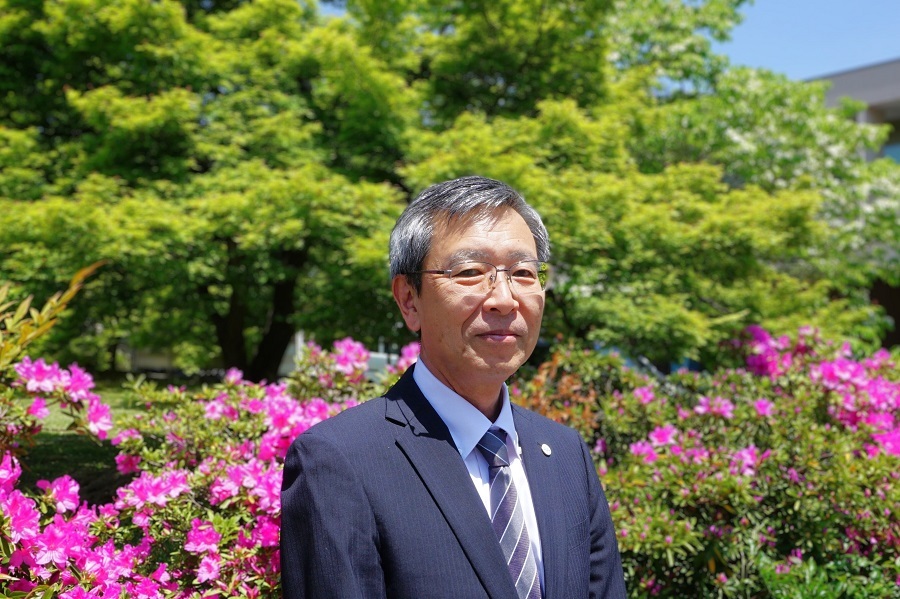Outline
- HOME
- Outline
Message from the President

National Institute of Technology (KOSEN), Nagano College was established in 1963 and have produced many excellent engineers who have supported the development of science and technology in Japan. Today, kosen educational system is highly regarded for its role in industry.
From the 2022 academic year, the previous five departments have merged into the Faculty of Engineering, which consists of three departments:Informatics and Electronics, Mechanics and Robotics, and Civil Engineering. In addition, by organizing Liberal Arts Education Academy, general education allowed for further intellectual exploration. Another feature of the reform is the introduction of a minor to develop human resources capable of responding to recent changes in industrial structure and
technology, as well as to the needs of an increasingly diverse world. We also promote overseas training and internships to develop human resources with a global mindset.
Recently, half of the students have found employment in the private or public sector after graduation. Students who wish to acquire more advanced scientific skills can enroll in special courses or transfer to the third year of university. Based on the educational philosophy “A Good Engineer must first be a Good Person,” we aim to foster practical and creative engineers who can tenaciously face the complex and difficult challenges of a globalized society and open the way to a bright future.
Nobuki Hayase
Education system of KOSEN (Colleges of Technology)
National Colleges of Technology are a group of schools of higher education that are similar to universities. They were established in 1962 in response to a demand for engineers having practical skills. Their educational system is different from that of universities because they offer a five-year program, or a five-and-a-half year program in the colleges of maritime technology to students graduating from junior high school, in order to train the types of engineers required in society.
The curriculum devotes ample time for experiments, practical training, and designing and draftsmanship, so that students will graduate as practical and developmental engineers having international standards of engineering. Students graduate from National Colleges of Technology with an associate's degree in engineering.
In addition to the five-year course, students can choose to continue onto the two-year advanced courses to acquire further advanced education in engineering, or to transfer to universities as junioryear students. Graduating from the advanced courses earns them Bachelor's degree in engineering.
Today, Japan has 55 national colleges of technology. Since the Institute of National Colleges of Technology was initiated in 2004, these colleges have been utilizing the new system to their benefit.

Educational Philosophy
A Good Engineer must first be a Good Person.
School Emblem

The school emblem consists of the two letters "kousen" (technical college) surrounded by the young leaves and buds of a linden tree, with a mountain shape at the top.
Logo

The "N" of National Institute of Technology, Nagano College is depicted as the powerful current of the Chikuma River in Nagano Prefecture, and the educational philosophy of "knowledge, virtue, and body" is expressed using the red of the sun illuminating the future, the light blue of melting snow, and the green color of the mountains.
Educational and Administrative Policy
- Based on the educational philosophy, we aim to be an institution of higher education that fosters practical engineers with rich humanity, originality, and creativity. In addition, we establish an educational system to foster engineers who can respond to advances in science and technology, social issues, and globalization.
-
We will collaborate with the local community and manage the school in close connection with the region. Additionally, we aim to nurture students who are valued and loved by the community, thereby fulfilling our mission as a higher education institution that is needed by society.
Ideal Image of Human Resources
- Practical engineers who have basic knowledge of engineering, possess a sense of ethics, discover problems on their own, and can solve problems by using their technical knowledge and skills.
- People who are broadly educated, show interest in social, environmental and other issues, and actively participate in society with their leadership.
- People who respect cultural diversity can play an active role in exchanges with other countries and contribute to the international community.
JABEE Accredited Program
JABEE (Japan Accreditation Board for Engineering Education) is an accreditation body that impartially evaluates the engineering education programs offered by higher education institutions to ensure that they meet the required standards of society. Once a program is assessed by JABEE and certified as meeting these standards, it is recognized as fulfilling the international standard. In 2005, the school underwent a JABEE examination for an engineer education program called “Industrial Systems Engineering” and was accredited in the field related to engineering (fusion, complex, and new fields), and is providing education under this program.
Concept of the “Industrial Systems Engineering” Program
The goal of this program is to provide students with basic knowledge and skills in the specialized fields of mechanical, electrical and electronic, electronic control, electronic information, and environmental and urban engineering. Furthermore, it aims to foster engineers who can demonstrate a higher level of expertise by acquiring practical skills through off-campus training in addition to advanced specialized education in the complex field of production environmental systems and electrical information systems.